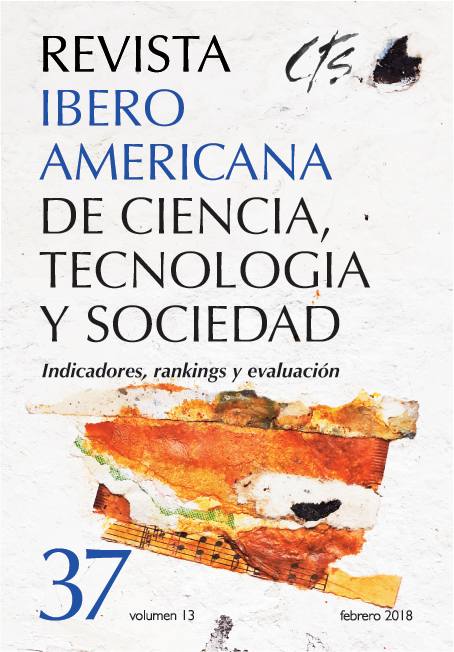International University Rankings and Conflicts Regarding the Regulation of Higher Education
Keywords:
international university rankings, higher education coordination, international publishers of academic journalsAbstract
The international university rankings are a controversial issue that has increasing consequences for and reach in society at large. While the questions increase regarding the effective capabilities of this instrument to value the quality of education and the methodology applied, they are presented, above all in the debate promoted by communication media, as rigorous and objective sources for evaluating the quality of universities. However, the consultancy firms that market them are generally linked to the large international publishers that dominate the academic journals’ market. Powerful commercial interests exist behind the evaluation systems related to the control of “refereed” journals and their effects. Concurrently with the growth of their legitimacy and prestige before society, issues arise with other parties due to the coordination of higher education, in particular with the universities affected, the States that try to promote effective mechanisms to improve quality and also the markets that the university graduates will join and that seek different areas of competency to those promoted by the editorial market, which is solely interested in publishing papers. Because of these reasons, it is doubtful that rankings contribute to effectively value the quality of the universities, nor are their actions neutral, given that, as their encroachment increases, they can promote biases and distortions in the processes and practices developed by the universities.Downloads
References
ALBORNOZ, M. y OSORIO, L. (2017): “Uso público de la información: el caso de los rankings de universidades”, Revista Iberoamericana de Ciencia, Tecnología y Sociedad, vol. 12, n° 36, pp. 11-49.
BARSKY, O. (2014): La evaluación de la calidad académica en debate: los rankings internacionales de las universidades y el rol de las revistas científicas, Buenos Aires, Teseo, Universidad Abierta Interamericana.
BARSKY, O. y DÁVILA, M. (2010): “La evaluación de posgrados en la Argentina”, Las carreras de posgrado en la Argentina y su evaluación, Buenos Aires, Teseo, Universidad de Belgrano.
BRUNNER, J.J. y URIBE, D. (2007): Mercados universitarios: el nuevo escenario de la educación superior, Santiago de Chile, Universidad Diego Portales.
CLARK, B. (1983): The Higher Education System. Academic Organization in Cross National Perspective, Universiy of California Press,
DÁVILA, M. (2012): Tendencias recientes de los posgrados en América Latina, Buenos Aires, Teseo, Universidad Abierta Interamericana.
DÁVILA, M. y GUAGLIANONE, A. (2013): “La investigación en las universidades y su evaluación. Un estudio comparado entre Argentina, Brasil y Uruguay”, Revista Debate Universitario, n° 3.
GARCÍA DE FANELLI, A. (2004): “La gestión universitaria en tiempos de restricción fiscal y crecientes demandas sociales”, en O. Barsky, V. Sigal y M. Dávila (coords.): Los desafíos de la universidad argentina, Buenos Aires, Siglo XXI editores, Universidad de Belgrano.
GIBBONS, M. et al. (1997): La nueva producción del conocimiento. La dinámica de la ciencia y la investigación en las sociedades contemporáneas, Barcelona, Pomares, Corredor.
LLOYD, M. W., ORDORIKA S. I. y RODRÍGUEZ GÓMEZ GUERRA, R. (2011): Los Rankings Internacionales de Universidades, su impacto, metodología y evolución, México DF, DGEI-UNAM.
OEI (2016): “Taller Indicadores, Rankings y Evaluación”, Buenos Aires, Centro de Altos Estudios Universitarios (CAEU-OEI).
ORDORIKA, I. (2015): “Rankings Universitarios”, Revista de la Educación Superior, vol. 44, n° 173, pp. 7-9.
PÉREZ RASETTI, C. (2010): “El marketing pretencioso de los rankings de
universidades”, El debate: Rankings de universidades, a favor y en contra, Texto II, Foro CTS, Revista Iberoamericana de Ciencia, Tecnología y Sociedad. Disponible en: http://www.revistacts.net/index.php?option=com_content&view=article&id=345:eldebate-rankings-de-universidades-a-favor-y-en-contra&catid=19:debates&Itemid=38.
UNIVERSIDAD DE NAVARRA (2015): “Building Universities Reputation”, Pamplona, Universidad de Navarra, 22 al 24 de abril.
Downloads
Published
How to Cite
Issue
Section
License
All CTS's issues and academic articles are under a CC-BY license.
Since 2007, CTS has provided open and free access to all its contents, including the complete archive of its quarterly edition and the different products presented in its electronic platform. This decision is based on the belief that offering free access to published materials helps to build a greater and better exchange of knowledge.
In turn, for the quarterly edition, CTS allows institutional and thematic repositories, as well as personal web pages, to self-archive articles in their post-print or editorial version, immediately after the publication of the final version of each issue and under the condition that a link to the original source will be incorporated into the self-archive.











